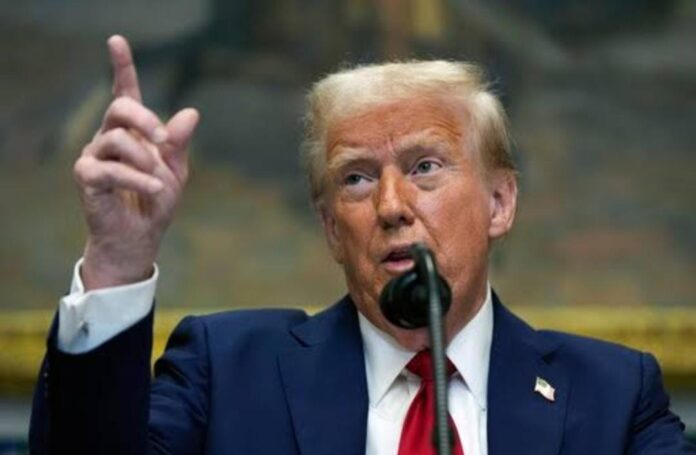Dr Satish Misra
New Delhi: Prime Minister Narendra Modi’s ‘friend’ US President Donald Trump dropped the “tariff” bomb immediately before bilateral talks with the visiting official guest, saying it would face reciprocal tariffs – meaning whatever duties and taxes New Delhi charges on US goods, the same will apply to its goods entering the US.
Trump announced this at a joint press conference with Prime Minister Narendra Modi in Washington DC early on Friday morning – Indian time.
Answering questions on tariffs at a joint press conference with Modi, Trump said, “So we’re just going to do it the easy way. And we’re just going to say: Whatever you charge, we charge.”
In simple words, Trump has said that he is leaving it up to India to lower tariffs for US goods entering India, or else the US will charge the same duties and taxes.
Trump had met Modi after he signed an executive order laying the groundwork for what he calls reciprocal tariffs: “Whatever other countries charge for import taxes on US goods, he plans to charge the same rate.”
Trump said, “I had discussions with India in the first term about the fact that their tariffs were very high, and I was unable to get a concession.”
Trump was critical of India’s high tariff rate on US products, mentioning how US-made cars were being taxed. India, he said, has been to us just about the highest tariff nation in the world.
“They have been very strong on tariffs. I don’t blame them necessarily, but it’s a different way of doing business,” Trump added. “It’s very hard to sell into India because they have trade barriers, very strong tariffs,” the US President said bluntly in the face of PM Modi which must have made the guest uncomfortable
Trump and Modi had taken to their White House press statement podiums to share the results of their discussions.
Tasked to damage control, Indian Foreign Secretary Vikram Misri tried to underplay the frank and bold words of the US President saying at a media briefing after the Modi-Trump meeting that “both countries have agreed to negotiate the first tranche of mutually beneficial multi-sector bilateral agreement by fall (Sept-Oct) of 2025.”
Both countries will take an integrated approach to strengthen bilateral trade across goods and services sectors. This will include market access, reducing tariffs, and reducing barriers. Trump also said Modi had agreed to limiting tariffs against US products and would work to make the US the leading supplier of oil and natural gas for India.
Vikram Misri, at a media briefing, said India was already sourcing some $15 billion worth of gas from the US and this could go up to $25 billion. Trump began by praising Modi and saying he aimed to “deepen every aspect of our partnership and our friendship.”
India and the US announced a framework to strengthen ties even further economically and increased military sales to India by many billions of dollars. Trump even said the process to sell the 5th generation fighter jet, the F-35, has started.
Anticipating that the mention of “increased military sale to India by many billion dollars” may give a handle to the opposition to grill the Modi government, Vikram Misri later issued a denial to the media asserting that India has not issued a request seeking proposals on acquiring such an advanced aviation platform.
Also, Modi and Trump will be working together to confront the threat of radical Islamic terrorism – a threat all over the world, actually. Both leaders spoke to what Trump referred to earlier as “radical Islamic terrorism,” with Modi praising Trump for approving the extradition of Tahawwur Rana, a Chicago businessman accused of participating in the 2008 attacks in Mumbai. Rana has already been convicted in India for his role in the 2008 attacks, which killed an estimated 175 people. The US Supreme Court rejected an appeal to review his extradition. Rana is expected to face the death penalty once returned to India.
“India and the US will stand strongly together in the fight against terrorism,” Modi said in his remarks. The PM added, “We agree that in order to eliminate cross-border terrorism, we need concrete actions. And I’m very grateful to President Trump that, in 2008, somebody who carried out genocide in India – and that criminal is now going to be handed over to India.”
Modi also shared with Trump his concerns over the recent developments in Bangladesh and how India sees the situation in that country, Foreign Secretary Vikram Misri has said.
Trump hosted Modi for talks at the White House on Thursday (Friday India time) during which they discussed bilateral, regional and global issues.
At a media briefing, Misri said the situation in Bangladesh was a subject of discussion between the two leaders.
“And the Prime Minister shared his views and, indeed, his concerns with regard to recent developments in Bangladesh and how India sees the situation,” he said.
“I think we hope that the situation in Bangladesh will also move forward in a direction where we can pursue relations in a constructive and stable way with them,” the foreign secretary said.
“But there are concerns about that situation. And the Prime Minister shared those views with President Trump,” he said.
There has been a sharp downturn in India-Bangladesh relations after deposed prime minister Sheikh Hasina fled Dhaka in August in the face of a massive anti-government protest.
The relations nosedived dramatically after the interim government headed by Muhammad Yunus failed to contain attacks on minorities, especially Hindus, in that country.


